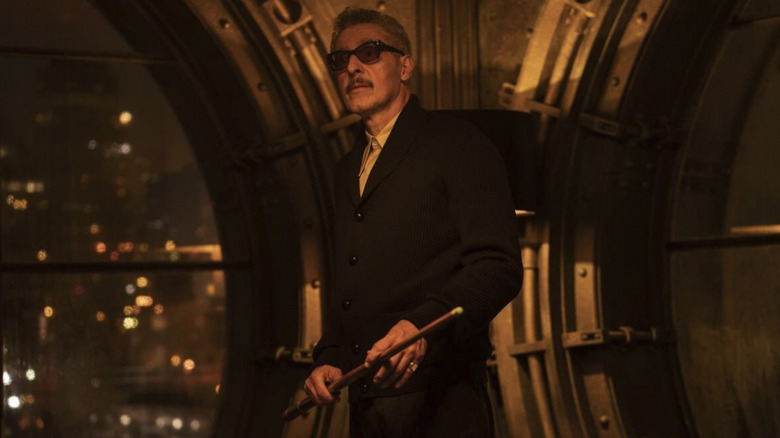
I was prepared to love "The Batman." Almost determined to, actually. I wouldn't say I'm a fan of Batman, per se — his determination to fight petty criminals on the street instead of the systemic practices that put them there has always left a bad taste in my mouth. Plus, we've had like ... a lot of Batmen. Nine, not including Will Arnett's role in the hilarious "The LEGO Batman Movie" or Keanu Reeves' upcoming turn as the Caped Crusader in "DC League of Super-Pets." I wasn't sure we needed another, not even to spite the weirdos who doubted Robert Pattinson.
Despite my reservations, I had confidence in Matt Reeves, who insisted "The Batman" would skew much closer to the character's roots in horror and noir. That he drew so brazenly from the work of David Fincher — who makes my favorite kind of film, if anyone was curious — was almost more exciting than the cast he had assembled. That "The Batman" was, on paper, an iteration of "Se7en" if Brad Pitt's Agent Mills were replaced by Batman, spliced with the seedy corruption of "Chinatown" and set to one long Nirvana interlude, pretty much guaranteed that I'd be singing its praises. And to the credit of everyone involved, they really almost had me.
Pattinson makes a fittingly emo Bruce Wayne, and the cast surrounding him — Zoë Kravitz, Jeffrey Wright, Paul Dano, and Colin Farrell — seem equally born to play their respective characters. Sure, the film isn't without its shortcomings: Its halfhearted script essentially bars its cast from surpassing the textbook shallowness of a comic book movie. It has some big ideas, most of which live in the unfamiliar (even uncomfortable) corners of Gotham's underworld — but discussions surrounding sex work, race and privilege, and even police brutality don't get much time to shine, either.
In a world where movies are more accustomed to pulling their punches than saying anything meaningful, that isn't exactly shocking. But I certainly expected something different from Reeves, and it seemed like he was prepared to give it — that is, until, the film's regressive third act pivot.
The Dark Knight Rises To The Challenge
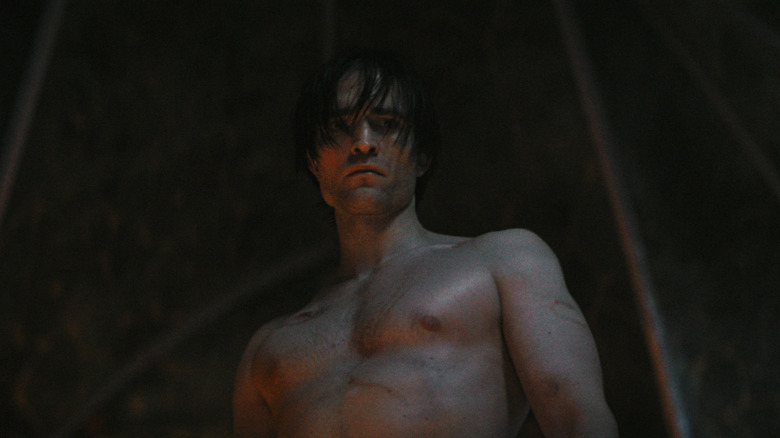
As everyone certainly knows by now, "The Batman" sits at a plush three-hour runtime. For the most part, it absolutely flies by: The film is juggling a number of themes and threads, but Reeves and co-writer Peter Craig cleverly utilize Bruce's allies (and enemies) to keep everything moving swiftly.
Each character Bruce/the Bat encounters represents a battle that he must eventually face. Kravitz's Selina Kyle represents the women that Gotham underestimates, abuses, and discards — the classic "femme fatale" of the noir genre, repackaged for a post-#MeToo landscape. Batman's quasi-partner James Gordon represents the police force, which, though currently rotten from the inside out, still (sigh) apparently has a chance at redemption. Then there's the Penguin, a wildly entertaining stand-in for the criminal underworld. Other archetypes pop up in between, like the politicians trying (and failing) to make an impression on their rotten city, but it all leads back to mob boss Carmine Falcone — and it's this connection that the Riddler desperately wants Batman to understand.
The Riddler's murders are all tied to the corruption at the heart of Gotham City. At first, his attentions feel designed to draw out the crime boss with ties to the highest offices in the land — but as Bruce eventually discovers, the Riddler actually has it out for him.
"The Batman" makes a bold choice by expanding the role of Bruce's parents and saddling the late plutocrats with some much-needed accountability. We're fortunately spared from a retread of their infamous alleyway murders, but their legacy — and their secrets — still haunt Bruce 20-odd years later. It turns out that mayoral candidate and resident billionaire Thomas Wayne cut a deal of sorts with Falcone before he met his untimely end. To add to the shock factor, Bruce also discovers that his father's Gotham Renewal Fund has since been appropriated by the same dirty politicians, cops, and businessmen that the Riddler has been targeting. Not only are the Waynes at the center of the conspiracy, the Riddler believes that they caused it — however indirectly.
Vengeance In All The Wrong Places
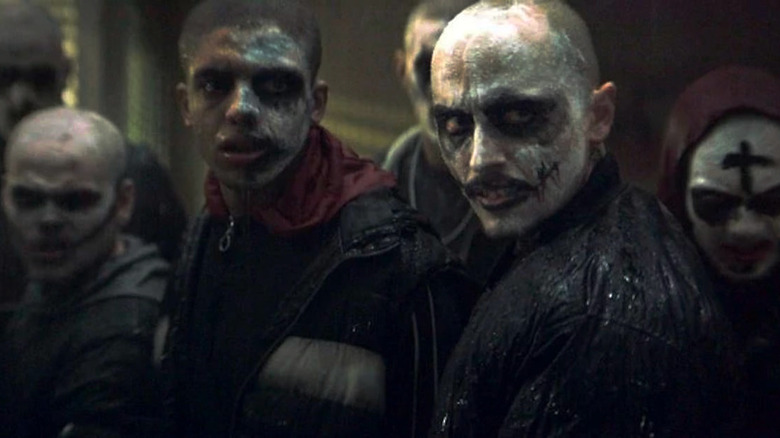
This revelation is one of many that challenges Bruce's binary view of Gotham, and his inherent privilege. Even Selina clocks that the Batman, whoever he is, must have grown up rich. On this point alone, the film goes farther in finally addressing what makes Batman such a tough character to root for in a Post-Occupy, Post-Defund the Police society. He may not always be a friend to the cops (and for the first two acts of "The Batman," that shows no sign of changing), but he does still spend most nights brutalizing street-level criminals — attacking the symptom, not the cause.
The Riddler is the only one capable of turning Bruce's attention where it needs to be, to the high-level corruption that didn't necessarily start with his father, but could have ended with him. The film suggests that Bruce must atone for Thomas' sins — several times, in fact — so often that it seems like the Riddler may be poised to out his true identity as a form of penance.
Confusingly (and despite the Bruce Wayne-themed collage on his wall at home), the Riddler doesn't actually know the Batman's alter ego ... or if he does, he doesn't care. The same could almost be said for Reeves, who neglects to really let his hero develop outside of the cowl and cape. Does the film suffer for it? Not necessarily. Bruce is only in year two of his time as Batman, so he's yet to cultivate his playboy alter ego, which is more than fine: We're all sick of that dude. But if there's one thing that the Riddler should have taught him, it's that he needs to be Bruce Wayne whether he likes it or not. Becoming Bruce is a key part of rehabilitating Gotham, and a key part of his growth as the hero his city deserves.
Instead, the story remains doggedly focused on Batman, which forces the plot to pivot from its natural progression at the very last second. From there, things get pretty cookie-cutter: The Riddler suddenly drops his festering obsession with the one-percenters and instead sics his army of incels on the regular people of Gotham. Batman must team up with the cops (who actually aren't all corrupt after all!) to defeat the Riddler's faceless group of radicals ... and just like that, we're right back where we started.
He's A Good Cop
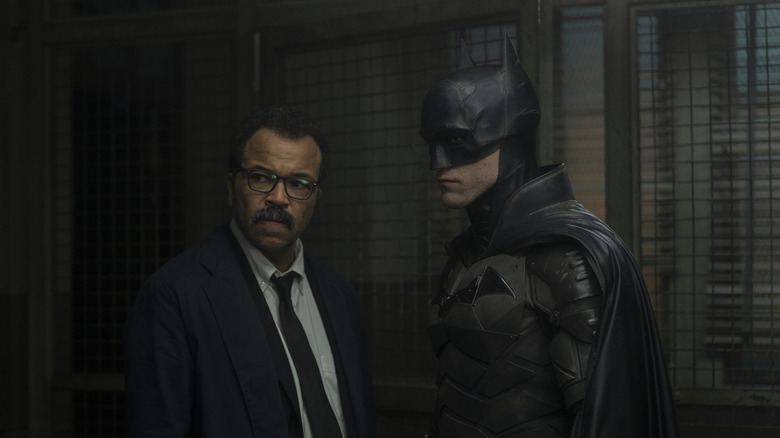
Until this point, "The Batman" was poised to deliver the bleakest portrayal of Gotham yet, where corruption has seeped into every facet of the city. The police force, the politicians, and even Gotham's founding families have been tainted by it. It's a truth that has rarely transitioned smoothly from the source material to the adaptation: Batman films have always relied on their colorful supervillains to show how far Gotham has fallen.
This revelation is due in part to Reeves himself. The director was adamant about portraying a city that seemed "sick" from the inside out, and a hero overwhelmed by the darkness of it all. His Batman is pretty much alone in his pursuit to turn Gotham around, and he's in way over his head. Bruce admits within the film's first 30 minutes that he can't be everywhere at once — and though it's clear that it's because he's fighting crime in all the wrong places, one can't help but feel bad for the guy. His privilege betrays his naiveté, and his bias against street-level criminals. But through his interactions with the Riddler, Selina, and the Penguin, he begins to see how his prejudice both informed and hindered his work (and left the white-collar big shots free to pull strings in the shadows).
In this way, "The Batman" follows the arc of an archetypal detective film, albeit with the socially-aware twist that made "Batman: Year One" such a refreshing take on the character. Unfortunately, it must also be a Batman film at the end of the day — which means that Gotham's sickness apparently has a quick and easy cure.
Just as everything begins with Carmine Falcone, Gotham's corruption also seems to end with him. Once Falcone is killed by the Riddler, corruption as a concept is never brought up again. His death ties up loose ends for many of the film's most compelling threads with varying success. Gordon is able to round up a startling number of seemingly non-dirty cops to arrest Falcone — and though another crime boss will inevitably be rising to take Falcone's place (cough, The Penguin), Batman has bigger fish to fry. He and the GCPD set out to capture the Riddler, but they still get caught up in his biggest scheme yet when he floods the streets of Gotham.
Too Much, Too Late
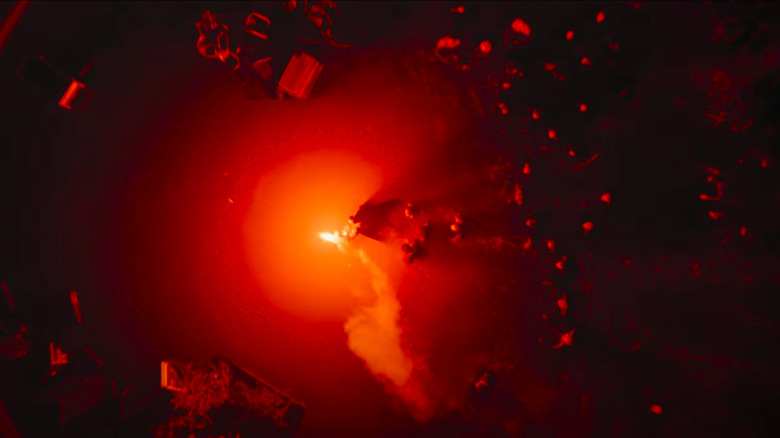
The film's final action piece (one of the rare parts of "The Batman" that connect it to traditional blockbuster storytelling) seems designed to distract from what could have been. When the Riddler floods the city, it essentially allows Bruce to remain behind his mask. He finally becomes the hero he thinks Gotham deserves, a beacon of hope — and it's great to see him saving people instead of only brutalizing criminals. But in the face of all the progress that'd been building in the first two acts, it feels like a massive regression.
Becoming Gotham's (white) savior allows Bruce to avoid the uncomfortable truth that his privilege represents. Facing off against the Riddler's makeshift army also reinforces his prejudice against the criminals in his city. He should be fighting the corrupt leaders who doomed Gotham in the first place, but the havoc the Riddler has caused presents a much more pressing issue.
Bruce emerges from the ordeal as a literal beacon of the city. Armed with only a flare, he leads the flood survivors out of the darkness and (sigh) into the light of a new day — literally. He even assists in the relief effort, dressed in full Bat regalia. It's a full-circle moment — but where most fans were moved by it, I couldn't help but feel robbed. Here we were, on the precipice of a film that had subverted the worst of the superhero genre, only to swerve into familiar territory by the third act.
There's a reason why "The Batman" feels 40 minutes too long for some. It's because the film's final sequence is a complete departure from the greatness that had been building up to then. By the end, it doesn't feel like anything new has been said. Tough themes have been mentioned, but never fully unpacked. Just as Bruce hides behind his obsequious wealth, "The Batman" hides behind its responsibilities as a superhero flick, abandoning its unconventional themes in favor of some last-minute spectacle. It doesn't all-out ruin the film, but it does present a frustrating conclusion to a "mainstream" blockbuster that could have really changed the conversation around superhero fare.
Read this next: The 11 Coolest Easter Eggs In The Batman
The post The Batman is an Incredible Superhero Movie – Until the Grand Finale appeared first on /Film.
0 Commentaires